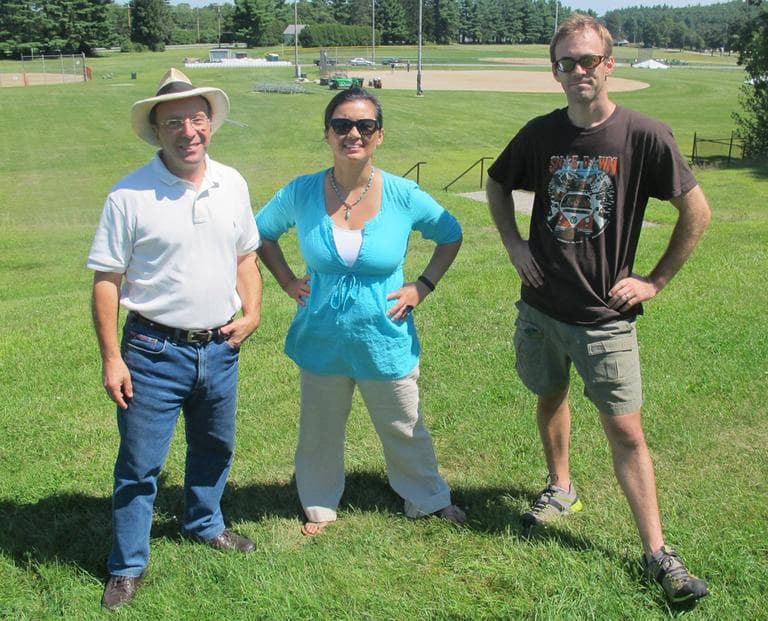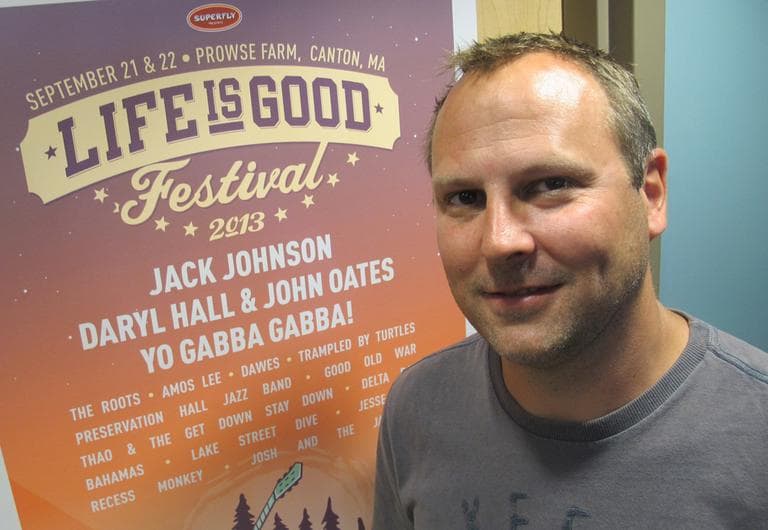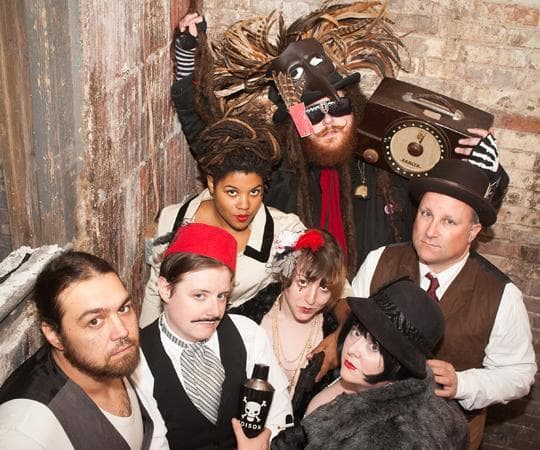Advertisement
Boom Or Bust: Can Massachusetts' Music Festival Frenzy Last?
There are more music festivals in the U.S. than ever before. Think Bonnaroo, Coachella and this weekend's Outside Lands in San Francisco, where organizers sell thousands of tickets to fans hungry for band-packed weekends.
The smaller, regional industry is booming, too. Here in Massachusetts we’ve got a bunch, including Life is Good, the new Boston Calling and now The Nines, which debuts Saturday at the former U.S. Army base in Devens, about 35 miles northwest of Boston.
On a sunny summer day workers raised bright white tents that seemed to glow in contrast to the deep green grass. They were surrounded by the other ingredients needed to concoct a successful music festival.
“Tables, toilets, stages, chairs,” Dave Werlin listed off, adding with a laugh, “you know, it is rocket science actually."
And he would know. Werlin owns Great Northeast Productions and has been a promoter for years. In the 1990s and early 2000s his group organized mega weekends for the exploratory jam band Phish. Last summer, Werlin teamed up with the central Massachusetts organization Three Rivers Arts to plan the transformation of a 35-acre fairground into The Nines.

"This year as a scaled-back one-day festival we’re using only a small portion of it," he said. But Werlin has a vision for the future of his boutique art and music fest.
That vision is optimistic, even though he full-well understands that first-time festivals rarely turn a profit. The Nines’ budget is in the “hundreds of thousands,” he said. They hope to sell 4,000 tickets. But next year the promoter wants more acreage, more audience and more music.
“As we enter Willard Field where the Nine of Diamond stage will sit, to the left of the stage will be the Cloud 9 Lounge. And on the other side of the stage will be Pluto's (the former ninth planet), which is a 21+ beer garden,” Werlin explained.
He's got a thing for the number nine, and the fest is rife with references to the digit. But there are 10 bands on the bill, including Explosions in the Sky.
Werlin’s main goal is to create a unique, personal atmosphere for music lovers — but he knows he’s not alone in his thinking.
“There does seem to be a trend toward more local festivals,” he mused. “You could call it a herd mentality. And we’re seeing more and more of artist driven festivals – like Wilco’s Solid Sound, Boston Calling and The Nines. Each one has its own niche.”
Young festivals need to develop more than a niche, according to music journalist Alan Light. The former editor-in-chief of Vibe and Spin magazines says they need a brand.
“It’s really about establishing a sensibility and creating an experience that differentiates you. And if you can do those things over a couple years then you can really create the momentum that people want to come just because they want to be there.”
Light says the folks behind big fests like Coachella and Bonnaroo have nailed it. They sell out thousands of early bird tickets before even announcing who’s playing because fans trust their track records. The success of those massive destination fests is enviable — but Light speculates that too many festivals might create a festival bubble.
“It’s gonna shake out, you know, like anything else,” he predicted. “There are some that have come and gone in a year or two. There are some that have announced and then bailed out before they got too far along in the process because they just couldn’t put it together. So I think there is a finite market, especially on the business side, but also on the audience side.”
Boston Calling's brand could be deemed urban. Promoters had no trouble finding an audience willing to pay $120 for early bird tickets — and $325 for VIP access — when they launched the weekend-long fest on City Hall Plaza this past May. They partnered with a big act: indie darlings The National. Band member Aaron Dessner even did double duty, performing as headliner and helping to curate the line up of 18 bands.
About 20,000 people attended each day. On the final night the second Boston Calling was announced for September. They anticipate equally strong sales this time around.
Boston Calling co-founder Brian Appel of Crashline Productions agreed there’s a rash of music festivals. He credits a “more bang for your buck” mentality from music fans, but he also wonders if the ways we consume music — through iPods or Pandora — are feeding the trend.
“It’s a little sporadic — and maybe it’s a little bit ADD — in the way that people have their playlists and everything else,” Appel said. "A music festival maybe is a manifestation of that, where you can go and see a band for 30 minutes, and then see something totally different 15 minutes later, as opposed to just one genre for the whole night.”
As for the possibility of over-saturation, Appel said he thinks too many festivals will hurt everyone in the long run.
“When we look around the landscape and we see festivals popping up you know, 100 miles from here, 300 miles from here, it becomes a little more challenging — maybe booking bands that could be pulled to different areas, or to look at sponsors who want to reach our audience but are also being approached by those festivals. So there are other lines of competition when you start to saturate the market beyond just the ticket buyer.”
But Appel also said promoters in Massachusetts maintain a friendly kind of competition.
“I met with the guy who runs the Life Is Good festival down in Canton, and we were just sitting there saying we don’t feel competitive, even though we're both producing music festivals that are within two weeks of each other that are 50 miles apart.”

“I’m that guy. My name is James MacDonald, and I produce and run the Life is Good Festival.”
It’s been around for 10 years. From the get-go Life is Good has been a feel-good, family friendly festival that raises money for sick kids. But it took a long time to establish that brand, according to MacDonald. He hopes to sell 30,000 tickets for the upcoming weekend in September, and said he respectfully pays attention to other promoters in the region — including Jay Sweet at the Newport Folk Festival — so they can avoid fighting over bands. But MacDonald admits he’s a bit jealous of the headlining act Boston Calling booked for next month.
“It would’ve been great for the Life is Good Festival to have Vampire Weekend this year. But we’re certainly happy with Jack Johnson and Daryl Hall and John Oates and the Roots.”
MacDonald doesn’t think the festival market has hit a saturation point, and he hopes it never does. For the moment he’s more worried about other forces beyond his control.
“That’s a funny thing about a music festival. It might rain on you. And you know what, the only other people in the world who know what that feeling is are the guys I would consider my competition,” he said with a laugh. “I guess that's what makes us kin.”
Jeffrey Dorenfeld, a music business professor at Berklee College of Music, said the way a festival handles something like bad weather is also critical. He led his “Silent Concert,” for kids at Lollapalooza in Chicago last year, and said lightning caused delays for some band's performances. Organizers cleared the stages, and had an app that told fans to come back after the threat passed.
“It was so smooth,” he recalled." For me that was more impressive than watching any of the acts.” Dorenfeld said he felt the same way after going to Lollapalooza this year.
He used to manage Ozzy Osbourne's tour accounting and has been in the music industry for decades.
“Yeah, there are over 200 festivals in the U.S. But you know, survival, I guess that’s the question, right?”
Today's audiences have come to expect more than just music at festivals, Dorenfeld said. Then he went back in time, recalling how different things were at an infamous, ultimately deadly outdoor festival in 1969.
“Look, I was at Altamont. I was at early festivals and they were terrible. I mean you stood in one place and watched bands play. They were dirty, and you couldn’t get food, and you couldn't get anything.” Now he says none of that's true. “You can walk in, you can walk out, and walk all around, sit on a hammock under a tree, you know, get a cocktail somewhere,” Dorenfeld said. “It’s going on vacation. That’s really what it is.”
For Dorenfeld creating that sort experience — and keeping it fresh — is the key to survival for all festivals, and he predicts a falling out. The cream will rise to the top, Dorenfeld believes, because ticket buyers will compare and can only afford to pay for so many shows a year. Then he posed the valid question to us all, “How many festivals are you going to?”

And what about the bands? Since the traditional music industry imploded musicians rely more heavily on touring for income. Headliners at huge fests pull in hundreds of thousands of dollars. Lesser-known bands make less — and sometimes nothing. There are groups that have made names for themselves by playing the festival circuit. Boston’s Walter Sickert and the Army of Broken Toys are taking the main stage at The Nines festival Saturday in Devens.
“And they paid us too!” exclaimed Sickert in his Dorchester home/practice space. “I can’t believe it. I think we’re the only unsigned band on the main stage, which is really exciting.”
Sickert says that playing at The Nines, with its diverse lineup, creates an opportunity to reach new music fans who might not even know his Army of Broken Toys exists. And the lead singer hopes the festival marketplace continues to boom because he said there are so many bands these days that are dying to play in front of live audiences.
Sickert appreciates what the people behind The Nines are doing, "Because from the start they’ve been really interested in the band. They know we’re weirdos — and they want weirdos, they want a nice variety of musical acts — and we’re happy to be the weirdos!"
But The Nines organizer Dave Werlin said Walter Sickert and his band will face some weird competition Saturday in Devens.
This program aired on August 9, 2013. The audio for this program is not available.
